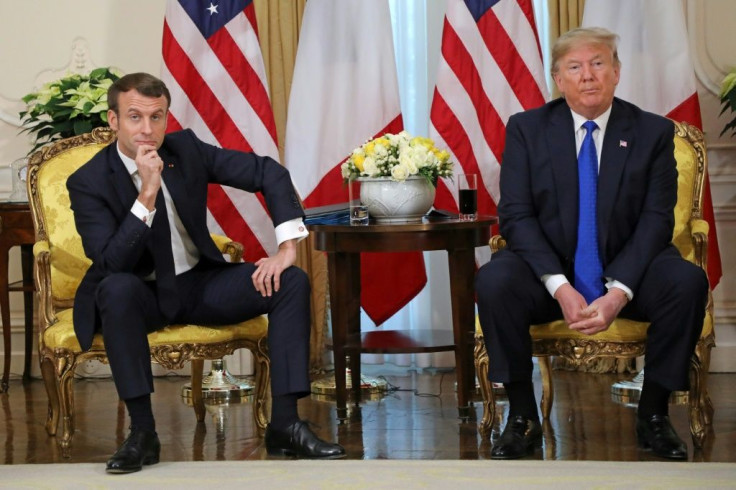Trump's Trade Whiplash Tests Partners, Markets, Own Aides

Donald Trump hailed a breakthrough in trade talks with China in mid-October, but seven weeks later says the deal may actually have to wait until after next year's US presidential elections.
In a surprise tweet, he re-imposed stinging metal tariffs on Brazil and Argentina, which the struggling Latin American economies thought were safely behind them.
And the night before important multilateral talks this week, he announced eye-watering new tariffs on French exports, instantly escalating a confrontation with the EU.
With just 12 days before fresh US tariffs on major Chinese imports are due to take effect, the whiplash of Trump's trade strategy appears to be driving up the stress level for economic partners and markets alike.
"Trump's mercurial nature injects a huge dose of uncertainty and volatility into trade negotiations between the US and its major trading partners," Cornell University economist Eswar Prasad told AFP.
Trump's "sharp pivots" also undercut his own negotiating team, Prasad added, and mean other countries are less likely to offer real concessions "since any potential deal risks being blown up by a Trump tweet or random statement."
Tuesday's remarks left Trump aides in the awkward position of explaining why the president announced a "very substantial phase one deal" on October 11 if at the time the cat was in fact not already in the bag.
Trump Senior Counselor Kellyanne Conway on Tuesday sparred with the press, answering questions with more questions.
"Why do you think we don't have a deal? Because you haven't seen it?" she said, according to a back-and-forth posted to Twitter by CNBC correspondent Eamon Javers.
"Is there a deal we haven't seen?" Javers replied.
"Are you saying the president lied that we don't have a phase one deal?"
"We haven't seen the deal."
"So?"
Stocks in recent weeks were also buffeted by the divergent tone of other White House officials. Trump last month himself shot down an announcement by the Chinese Commerce Ministry that both sides had agreed to a tariff rollback.
Wall Street on Tuesday touched its lowest levels since October as investors took profits from the rally of recent weeks -- one lifted by hopes for lasting trade peace between Washington and Beijing.
Karl Haeling of LBBW told AFP stocks were likely due to drop a little after repeatedly breaking records since Trump's "phase one" announcement.
But it was unclear whether lower prices would entice bargain hunting or convince investors "the world's coming to an end," he said.
Trump, for his part, told reporters the sell-off was "peanuts."
Cedric O, France's secretary of state for the digital economy, told AFP in Washington on Tuesday that Trump's threat to blast France with another $2.4 billion in tariffs next month was "unworthy" of an ally and economic partner.
As for the United States and China, the world's two largest economies have imposed steep tariffs on hundreds of billions of dollars in two-way trade, and another round of US duties are set to hit $160 billion in Chinese goods on December 15.
Though it is slowing in part due to the trade war, the US economy appears to be mostly weathering the storm so far, held aloft by steady consumer spending and low unemployment.
China has called for a rollback of existing tariffs, and analysts say Beijing is unlikely to agree to the massive purchases of US farm exports that Trump is demanding -- principal holdups in the deal.
"He's realized they're not going to give him what he wants," William Reinsch, a former president of the National Foreign Trade Council, told AFP, adding that this could tempt Trump "to pull the plug and blame the Chinese."
That would spare Trump the embarrassment of appearing to fail to clinch a deal just before the 2020 elections, said Reinsch.
"That's a decision that he's not gonna make at this point in the process but he's sort of inoculating himself against a Democratic attack which is: 'you failed.'"
© Copyright AFP {{Year}}. All rights reserved.





















